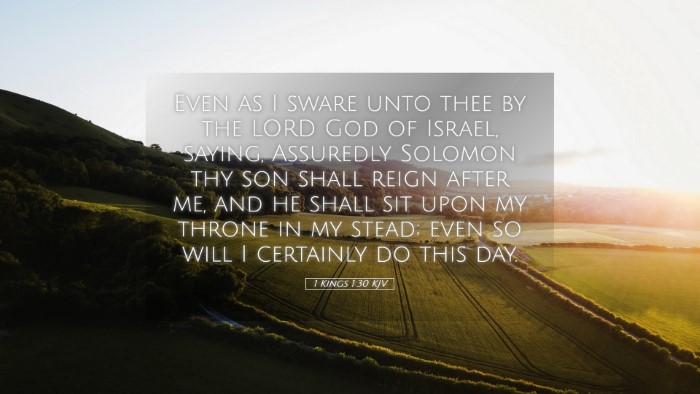Commentary on 1 Kings 1:30
Verse Context: In 1 Kings 1:30, we witness a significant moment in the narrative of Israel's monarchy. This verse is part of the larger story surrounding the succession of King David and the rise of Solomon as his chosen successor, fulfilling God's promise to David.
Verse Analysis
“And even as I swore unto thee by the Lord God of Israel, saying, ‘Assuredly Solomon thy son shall reign after me, and he shall sit upon my throne in my stead;’ so will I certainly do this day.”
Historical Background
This verse reflects a pivotal point in Israel’s history. David is nearing the end of his reign, stricken with age and weakness, and there is a looming political crisis. Adonijah, another son of David, attempts to seize the throne, setting the stage for conflict. David's reaffirmation of Solomon's divine right to rule is crucial in establishing a rightful succession.
Theological Significance
The verse encapsulates the important theological theme of God's sovereignty in human affairs. David's oath underscores God’s promise and covenant, emphasizing that divinely appointed leadership ensures stability and righteousness in governance. This leads to a broader reflection on the importance of divine direction in leadership, a theme that resonates throughout the Scripture.
Commentary Insights
- Matthew Henry's Commentary:
Matthew Henry emphasizes the faithfulness of God’s promises. David's declaration serves as a reaffirmation of God's choice of Solomon, and he highlights the necessity of recognizing and adhering to divine providence in matters of leadership. Henry suggests that the trust in God's plan can offer comfort through periods of uncertainty.
- Albert Barnes' Notes:
Albert Barnes notes the importance of Solomon's kingship in establishing a legacy. He underscores that the unity and continuity of Israel's monarchy hinge upon divine sanction. Barnes remarks on how David's actions serve both as a reminder and a warning about the consequences of ignoring God’s will in matters of succession.
- Adam Clarke's Commentary:
Adam Clarke provides a detailed analysis of the political implications involved in the moment. He comments on the social dynamics within David's court and the struggle between Adonijah and Solomon and points out that despite human attempts at control, it is God who ultimately establishes authority.
Practical Applications
The considerations from this verse provoke numerous applications for today’s leaders, scholars, and congregants:
- Leadership and Succession: The necessity of clear, God-ordained plans for leadership transitions reflects the importance of discernment and fidelity to divine instruction.
- Trust in Divine Sovereignty: The passage invites a deeper trust in God’s overarching plans, highlighting that while human ambitions may rise, God’s purposes will ultimately prevail.
- The Role of Promises: Just as David’s promise to Solomon bolstered his claim to the throne, God’s promises to believers provide assurance and encouragement in our spiritual journeys.
Conclusion
1 Kings 1:30 serves not only as a historical account but also as a profound reminder of divine authority in the affairs of men. It calls leaders and followers alike to recognize and submit to God's ordained purposes, affirming the idea that true leadership is rooted in divine commitment. The insights gathered from prominent commentaries shed light on the multifaceted implications of this verse, inspiring a pursuit of faithfulness and integrity among those who follow God.


